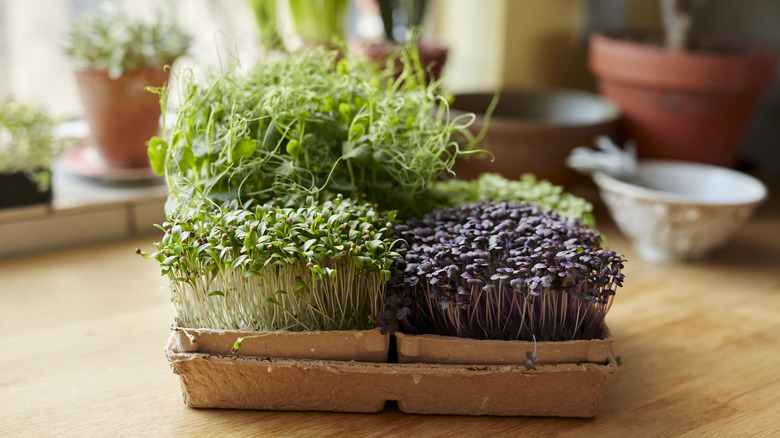TikTok Is In Love With This Easy-To-Grow Plant (And All Of Its Benefits)
The health benefits of chia seeds are no secret. Eating these tiny seeds provides your body with a complete protein source, a healthy fiber boost, antioxidants, omega-3 fatty acids, and minerals, including iron and calcium. It's truly no wonder chia seeds are commonly referred to as a "superfood." What many people didn't know — at least until TikTok blew the whistle — is that you can also use store-bought chia seeds to grow your own ultra-healthy microgreens right in your kitchen. While this hack might sound too good to be true, it really is simple and effective.
All you'll need is a handful of chia seeds, a damp paper towel (paper towels are known to speed up seed germination), water, a plate, and a sunny windowsill. Place the paper towel on the plate and then scatter a layer of chia seeds over it. Spray or pour enough water on the seeds to dampen them daily. Within a few days, you'll have sprouts ready to grow into delicious microgreens. But can you grow the entire chia plant to harvest your own seeds? You absolutely can.
How to grow your own chia plant
Microgreens aren't the only healthy foliage you can grow from your chia seeds. If you scroll a little farther down the chia seed rabbit hole on TikTok, you'll discover that you can also plant a handful of these wondrous seeds directly into a large pot of soil. Place the pot in full sunlight and keep the soil moist. Soon, you'll see leaves sprouting that look very similar to the microgreens method. However, let them continue to grow, and you'll have a full plant with larger, lime-green leaves in no time.
Eventually, your plant will also produce spikes of purple flowers. When these flowers die off and dry out, they become the source of the plant's chia seeds. Just place the dried flowers into a paper bag and shake to release the seeds. You can then use them to restock your grocery pantry, grow more microgreens, grow more full chia plants, or even add to your bird feeder. Chia seeds really are the tiny seeds that just keep on giving — in the kitchen and the garden.
